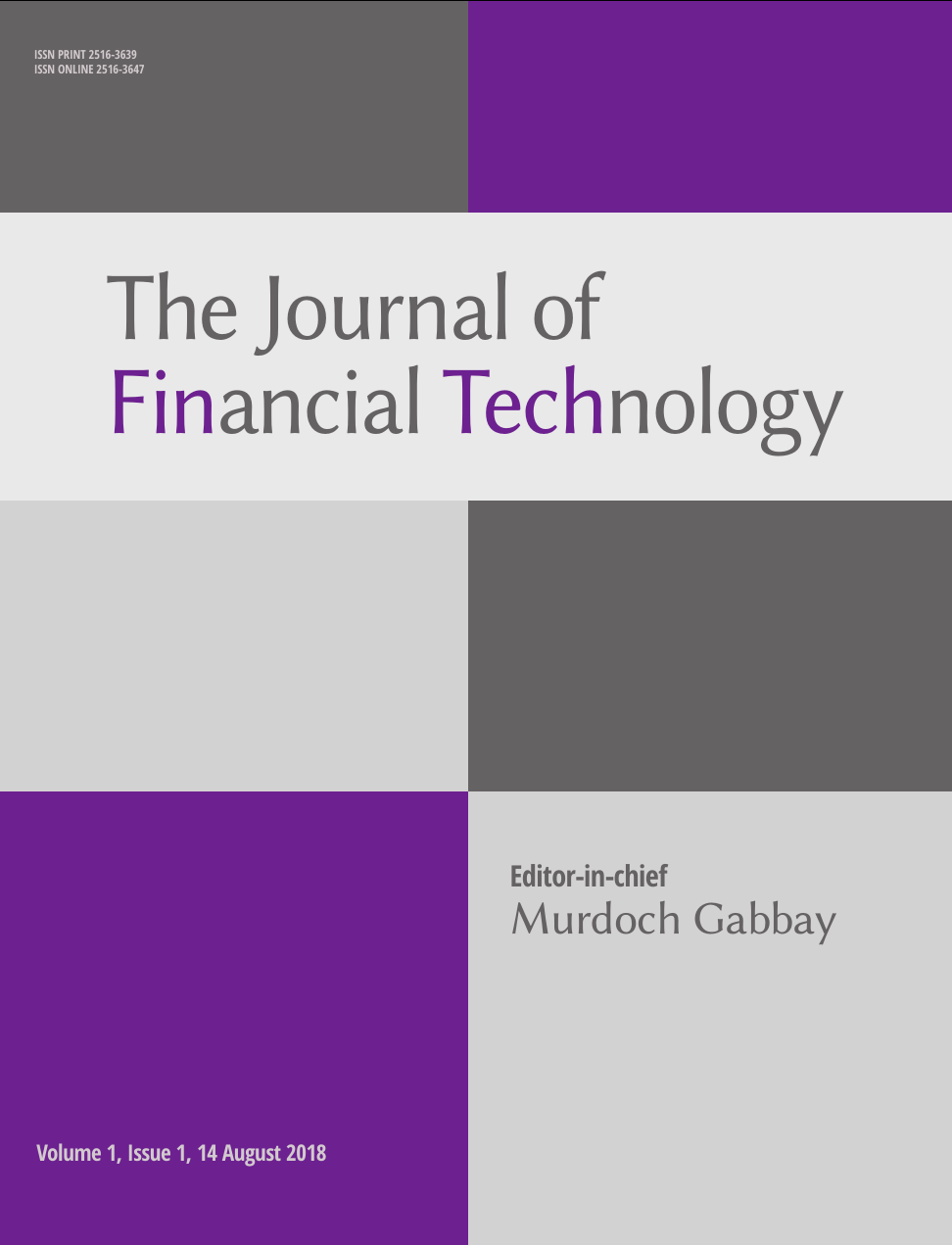-
Murdoch Gabbay, Heriot-Watt University, UK formal methods
Purpose

The JFT is a free and open-access academic journal founded to provide a high quality venue to publish, promote, publicise, and develop the fusion of
-
mathematics,
-
statistics,
-
computer science,
-
finance, and
-
law
in the new field of
-
financial technology (fintech).
Publication and copyright
Publication is electronic and in print via College Publications.
Publication is free and open-access online to authors and readers. Print copies will be available from Amazon.
Authors retain copyright of their work.
Quality is high and there is an editorial emphasis on serving science and fintech by bringing insightful, rigorous, well-written papers to fruition.
Recent publications
-
An Analysis of the Correctness and Computational Complexity of Path Planning in Payment Channel Networks by Padraig Corcoran and Rhyd Lewis. Published online 20 January 2025. https://doi.org/10.48550/arXiv.2501.11419
-
Escrows are Optics by Fabrizio Genovese, Fosco Loregian, and Daniele Palombi. Accepted June 19, 2023. Published online 26 June 2023. https://arxiv.org/abs/2105.10028
Editor-in-chief
Editors
-
Tomaso Aste, University College London, UK
risk, complex systems, blockchain -
Devraj Basu, Strathclyde University, UK
finance, data analytics -
Bill Buchanan, Napier University, UK
cyber security, cryptography, distributed computing and networks, trust -
Ittay Eyal, Technion, Israel
security, distributed systems, blockchain, cryptocurrencies, trusted execution -
Katya Malinova, University of Toronto, Canada
financial economics, regulation, market design -
Rosario Mantegna, Palermo University, Italy
econophysics, analysis, modeling -
Fabio Massacci, University of Trento, Italy
cyber security, security methodologies -
Bruno Woltzenlogel Paleo, Input Output HK
logic, automated reasoning, formal methods, cryptocurrency, (permissioned) blockchain -
Gareth Peters, Heriot-Watt University, UK
finance, quantitative risk, risk management, algorithmic trading, regulation, blockchain -
Ilya Sergey, University College London, UK
programming language theory, verification, smart contracts, concurrency -
Daniele Venturi, Sapienza University of Rome, Italy
theoretical cryptography, multiparty computation, cloud security, zero knowledge -
Philip Wadler, University of Edinburgh, UK
programming languages, formal methods, functional programming, blockchain, smart contracts -
Angela Walch, St. Mary’s University School of Law, USA
governance and regulation -
Julian Williams, Durham University Business School, UK
markets, liquidity, algorithmic trading, operational security
Advising editors
Submissions Procedure
To submit a paper, please e-mail your submission as a pdf file to the editorial manager Jane Spurr (jane@janespurr.net). You may nominate an editor to handle your submission.
We encourage authors to typeset using LaTeX in IfCoLog style.
Other typesetting methods, such as word processors, are also permitted.
Criteria and Parameters
The scope of the JFT is as described above.
Since the scope is explicitly interdisciplinary — or perhaps: since it describes a discipline that is nascent with the journal itself — we impose no a priori format on papers, aside from basic typesetting guidelines. Papers should build on best practice in the relevant field; authors should nominate a handling editor familiar with the conventions of that field. Thus, the criteria and parameters for a JFT submission are
-
excellence, and
-
furthering science.
Editorial process
Please e-mail your submission in pdf format to Jane Spurr (jane@janespurr.net) as described in the submissions procedure.
A submission is first checked to identify whether it is in scope. If so, it is sent to an Editor chosen by the Editorial Manager (Jane Spurr) based on editors' expertise, availability, and any preference expressed by the authors.
The Editor recommends referees to the Editorial Manager, and the Editorial Manager then communicates with the referees and manages the process of collecting reports. Based on the referees' reports the Editor then makes a recommendation as follows:
-
Accept
Only minor corrections or revisions required which do not need checked by the Editor. -
Minor revision
The revised version may need checked by the Editor, or the referees, but only as a sanity check. -
Major revision
The revised version will be typically sent back to the referees for evaluation. -
Reject with resubmission
The paper has promise but is significantly deficient in some way. There is a path to resubmission, but it is uncertain whether the authors will wish to or be able to follow it. If resubmitted, the paper might be treated as a new submission. -
Reject
The paper is rejected and will not normally be reconsidered, even if revised. An out-of-scope would normally fall into this category.
In all cases, criticism should be constructive and aimed at creating a better paper that serves science and is a credit to the authors and academia.
Normally the submission process is managed by the Editorial Manager and the Editor. Edge cases, and issues of editorial policy, are decided by the Editor-in-Chief.
(The procedure for Special Issues is identical, but with the extra layer of management of Guest Editors handling that special issue.)
If accepted, a paper goes to Production, which may include copy editing for linguistic errors, style, and layout.
For queries about editorial process, or for proposals of special issues or similar matters, please contact the Editor-in-Chief.
ISSN
-
ISSN Print: 2516-3639
-
ISSN Online: 2516-3647
Deadlines
The JFT follows a rolling publication strategy: accepted papers are put online as they are ready, then collected into issues as appropriate. There is no deadline for issues.
Special issues (which are in preparation) are different and will have deadlines.